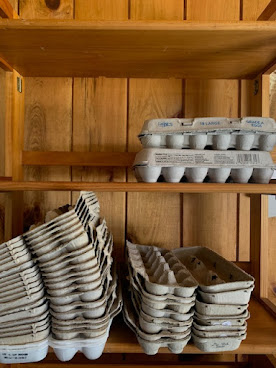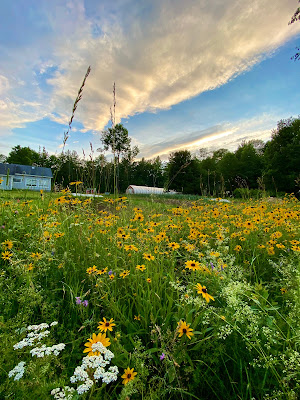Growing to feed or growing to be eaten?
As you should know, we are a CSA (Community Supported Agriculture) farm. This means that shareholders essentially own a portion of the garden crop, and will receive weekly distributions of whatever vegetables we are able to provide. We feel it’s important for our shareholders to know what’s going on at the farm in order to feel more connected to what they are supporting. It’s this interconnectedness, we believe, that makes a farm function at its best, and gives people the good feeling of being part of a healthy community. The reality is, sometimes, we should share the difficult news along with the good news. Reflection and communication with the community who supports us should be part of the process, right?
While we don't want to come across as being “negative”, a variety of circumstances have made the season thus far our most challenging one yet. First and foremost, COVID has brought on additional work and expenses in order to prepare and distribute the CSA vegetable shares. We are proud of being able to take safety first, but we miss the everyday interactions with shareholders that help to give our farm its community spirit. We had to cancel our annual Farm Open House (scheduled to happen today) due to COVID. This is sad.
In terms of the growing season, we’ve been in a drought for months, which has drained our two dug wells that we irrigate the gardens and greenhouses from. With an increased volume of planted vegetables this year over the past few seasons, attempts to get sufficient water on all growing spaces has been a constant endeavor, and quite honestly exhausting. Many of our vegetables have not received sufficient water to survive and be at their best this year.
Perhaps the most challenging factor we’ve faced this season, insects and pests have presented immense pressure, and in many cases completely destroyed various crops. Even crops that are traditionally easy to grow have been hit hard. All of our vegetables in the cucumber family (cucurbits) have been infected by the spotted cucumber beetle, for which there is not any simple organic solution to ridding these pests. In addition to eating the plants, the cucumber beetle carries a bacterial wilt disease that stunts the plants' growth, and in many cases kills them altogether. Our cucumber crop this year (after 4 plantings) is nearly wiped out. The final blow was today. I had replanted a cucumber crop at my parents’ house to escape the beetles. A week ago, we had noticed the tops were being “bitten” off the seedlings, so we installed row covers over them to protect them. This morning when I looked under the row covers, every single cucumber had lost all vegetation.
While we don't want to come across as being “negative”, a variety of circumstances have made the season thus far our most challenging one yet. First and foremost, COVID has brought on additional work and expenses in order to prepare and distribute the CSA vegetable shares. We are proud of being able to take safety first, but we miss the everyday interactions with shareholders that help to give our farm its community spirit. We had to cancel our annual Farm Open House (scheduled to happen today) due to COVID. This is sad.
In terms of the growing season, we’ve been in a drought for months, which has drained our two dug wells that we irrigate the gardens and greenhouses from. With an increased volume of planted vegetables this year over the past few seasons, attempts to get sufficient water on all growing spaces has been a constant endeavor, and quite honestly exhausting. Many of our vegetables have not received sufficient water to survive and be at their best this year.
Perhaps the most challenging factor we’ve faced this season, insects and pests have presented immense pressure, and in many cases completely destroyed various crops. Even crops that are traditionally easy to grow have been hit hard. All of our vegetables in the cucumber family (cucurbits) have been infected by the spotted cucumber beetle, for which there is not any simple organic solution to ridding these pests. In addition to eating the plants, the cucumber beetle carries a bacterial wilt disease that stunts the plants' growth, and in many cases kills them altogether. Our cucumber crop this year (after 4 plantings) is nearly wiped out. The final blow was today. I had replanted a cucumber crop at my parents’ house to escape the beetles. A week ago, we had noticed the tops were being “bitten” off the seedlings, so we installed row covers over them to protect them. This morning when I looked under the row covers, every single cucumber had lost all vegetation.
In addition to the cucumber family, our onions were the first vegetable of the season to be attacked by insects. Our onions were planted in containers back in February. After two and a half months nurturing, we planted 4,000 seedlings in the outdoor gardens. Three weeks after planting, a lot of the crop began to wilt over and die. After an investigation, we discovered the culprit was the onion maggot. Onions, like tomatoes, are one of our “staple” late summer/fall vegetables that we normally harvest in high numbers. Despite multiple onion plantings, we have very few that have survived. In addition, cutworms, cabbage loopers, garden voles, chipmunks, and Japanese beetles have all been present in higher numbers this season.
Despite the above challenges, we are proud of this year’s successes. To start, we had great early season greens and root veggies like radishes and beets. Our investment into another new greenhouse has made this possible. Our tomato crop, also being grown in the new greenhouse has been quite a success so far. In addition, we have been able to provide eggs and meat during a year of increased demand. Right now we are preparing to distribute carrots, garlic, more tomatoes, some onions, late summer/fall lettuce, fall root veggies (like turnips and radishes), and more herbs. The season has been very exciting for us as we never expected to have this many CCF consumers during the summer. Kudos to everyone who has continued to support us throughout these crazy times!
We have learned a lot from this year's challenges and will be able to make some changes and updates for next season.
Farming is more than just having a green thumb.
Thanks for the read.
Paul
Despite the above challenges, we are proud of this year’s successes. To start, we had great early season greens and root veggies like radishes and beets. Our investment into another new greenhouse has made this possible. Our tomato crop, also being grown in the new greenhouse has been quite a success so far. In addition, we have been able to provide eggs and meat during a year of increased demand. Right now we are preparing to distribute carrots, garlic, more tomatoes, some onions, late summer/fall lettuce, fall root veggies (like turnips and radishes), and more herbs. The season has been very exciting for us as we never expected to have this many CCF consumers during the summer. Kudos to everyone who has continued to support us throughout these crazy times!
We have learned a lot from this year's challenges and will be able to make some changes and updates for next season.
Farming is more than just having a green thumb.
Thanks for the read.
Paul




Comments
Post a Comment